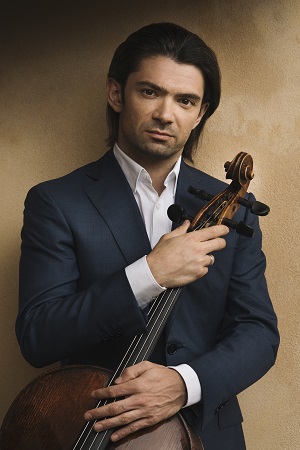 United States Mendelssohn, Ravel, Sibelius, Saint-Saëns, Elgar: Gautier Capuçon (cello), Kent/Blossom Chamber Orchestra / Vinay Parameswaran (conductor)*, Cleveland Orchestra / Gemma New (conductor), Blossom Music Center, Cuyahoga Falls, Ohio, 27.7.2019. (MSJ)
United States Mendelssohn, Ravel, Sibelius, Saint-Saëns, Elgar: Gautier Capuçon (cello), Kent/Blossom Chamber Orchestra / Vinay Parameswaran (conductor)*, Cleveland Orchestra / Gemma New (conductor), Blossom Music Center, Cuyahoga Falls, Ohio, 27.7.2019. (MSJ)

Mendelssohn – The Hebrides, Op.26*
Ravel – Suite from Mother Goose*
Sibelius – Finlandia
Saint-Saëns – Cello Concerto No.1 in A minor, Op.33
Elgar – Enigma Variations, Op.36*
Wow! The young New Zealand conductor, Gemma New, has been getting a lot of buzz in classical music circles. Last week, the Blossom Music Festival experienced the excitement when she stepped in for an ailing Bramwell Tovey — on a week’s notice — to make her debut with the Cleveland Orchestra.
For her sole program change, New substituted Sibelius’s Finlandia for Britten’s Four Sea Interludes — on paper, a little disappointing. But the instant the conductor snapped a decisive downbeat and drew a broad, glowering tone from the brass, it was clear that this would be no ordinary run-through. The atmosphere was electric as she challenged the orchestra, shaping Sibelius’ phrases with drama and fervor. It was easy — for once — to remember that Finlandia chronicles the struggles of a nation to achieve independence, truly a matter of life or death. When a program change is delivered with such alacrity, one can only cheer.
New kept the energy crackling for Saint-Saëns’s Cello Concerto No.1. Typically, the soloist is convincing but the orchestral role can be somewhat perfunctory. Saint-Saëns put the bulk of interest in the soloist, and there was no question that the compelling Gautier Capuçon would be a commanding one. But New insisted on meeting him every step of the way with an orchestral palette that matched the cellist — crisp, passionate, and debonair. Episodic by nature, the concerto had a level of focus I’ve frankly never heard.
Capuçon was riveting, drawing a range of colors from his 1701 Gofriller instrument. For all its beauty, the cello can be darkly mellow, and any soloist can be challenged to project its voice against a full orchestral contingent. But here he had no issues, and from the opening dramatic gestures through the softer moments, he made the instrument speak.
The last time the orchestra played Elgar’s Enigma Variations was a couple years ago, in a big-hearted reading led by Vladimir Ashkenazy. No less emotional, New’s approach sharpened the level of focus and detail. She blew away the cobwebs of the typical reserved approach to the composer, and honed in on the Mahlerian intensity that lurks beneath the surface.
New didn’t hesitate to shape phrases to emphasize the volatility, while at the same time demonstrated her awareness of traditional concepts. Most impressively, she showed no difficulty communicating her concepts to the musicians — the Cleveland ensemble considerably expanded with members of the Kent/Blossom Chamber Orchestra, for a large, compelling voice. The only weak spot — and purely a practical one — was the electronic organ near the end, which can’t compete with the pipe organ at Severance Hall. Even so, Elgar’s masterpiece vaulted onto a high plane with the breathtaking brooding of the penultimate variation, led by Afendi Yusuf’s clarinet solo.
In a pre-concert feature, conductor Vinay Parameswaran led the Kent/Blossom Chamber Orchestra — part of a summer training program for young people, boasting a high order of musicianship. Parameswaran, a Cleveland Orchestra assistant conductor, has showed his strengths on other occasions, but here he took a straight-jacketed approach to Mendelssohn’s Hebrides Overture and the suite from Ravel’s Ma mère l’Oye. Neither score — nor the young players — was served well.
These days, a classical approach to Mendelssohn is fashionable, but George Szell’s classic Cleveland recording demonstrates that rigor and expressivity can co-exist. Parameswaran’s version forced the composer’s inspiration into a single, unyielding tempo — too fast for the acoustic of the Blossom Pavilion.
With similar metronome tempi, the Ravel skated through, not allowing solo moments to shine, though KBCO concertmaster Jason Fung seized his moment and shone anyway. There was little attempt from the podium to savor the exquisite moments, all being sacrificed to forward movement, and despite precision work from the young players. Thankfully, the closing Elgar brought forth deeper emotions.
Mark Sebastian Jordan